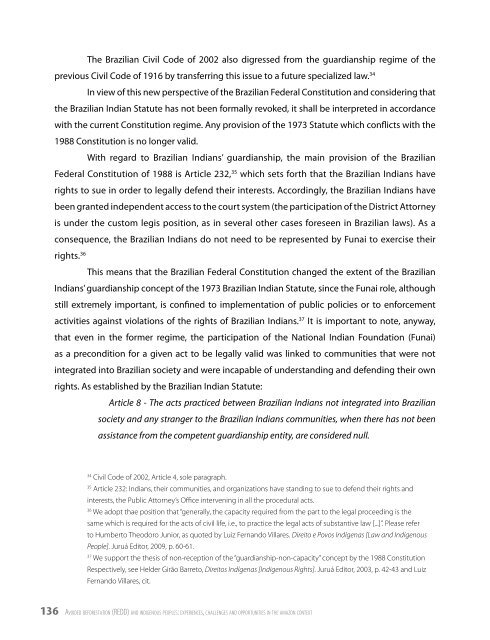Avoided Deforestation (REDD) and Indigenous ... - Amazon Fund
Avoided Deforestation (REDD) and Indigenous ... - Amazon Fund
Avoided Deforestation (REDD) and Indigenous ... - Amazon Fund
Create successful ePaper yourself
Turn your PDF publications into a flip-book with our unique Google optimized e-Paper software.
The Brazilian Civil Code of 2002 also digressed from the guardianship regime of the<br />
previous Civil Code of 1916 by transferring this issue to a future specialized law. 34<br />
In view of this new perspective of the Brazilian Federal Constitution <strong>and</strong> considering that<br />
the Brazilian Indian Statute has not been formally revoked, it shall be interpreted in accordance<br />
with the current Constitution regime. Any provision of the 1973 Statute which conflicts with the<br />
1988 Constitution is no longer valid.<br />
With regard to Brazilian Indians’ guardianship, the main provision of the Brazilian<br />
Federal Constitution of 1988 is Article 232, 35 which sets forth that the Brazilian Indians have<br />
rights to sue in order to legally defend their interests. Accordingly, the Brazilian Indians have<br />
been granted independent access to the court system (the participation of the District Attorney<br />
is under the custom legis position, as in several other cases foreseen in Brazilian laws). As a<br />
consequence, the Brazilian Indians do not need to be represented by Funai to exercise their<br />
rights. 36<br />
This means that the Brazilian Federal Constitution changed the extent of the Brazilian<br />
Indians’ guardianship concept of the 1973 Brazilian Indian Statute, since the Funai role, although<br />
still extremely important, is confined to implementation of public policies or to enforcement<br />
activities against violations of the rights of Brazilian Indians. 37 It is important to note, anyway,<br />
that even in the former regime, the participation of the National Indian Foundation (Funai)<br />
as a precondition for a given act to be legally valid was linked to communities that were not<br />
integrated into Brazilian society <strong>and</strong> were incapable of underst<strong>and</strong>ing <strong>and</strong> defending their own<br />
rights. As established by the Brazilian Indian Statute:<br />
Article 8 - The acts practiced between Brazilian Indians not integrated into Brazilian<br />
society <strong>and</strong> any stranger to the Brazilian Indians communities, when there has not been<br />
assistance from the competent guardianship entity, are considered null.<br />
34 Civil Code of 2002, Article 4, sole paragraph.<br />
35 Article 232: Indians, their communities, <strong>and</strong> organizations have st<strong>and</strong>ing to sue to defend their rights <strong>and</strong><br />
interests, the Public Attorney’s Office intervening in all the procedural acts.<br />
36 We adopt thae position that “generally, the capacity required from the part to the legal proceeding is the<br />
same which is required for the acts of civil life, i.e., to practice the legal acts of substantive law [...]”. Please refer<br />
to Humberto Theodoro Junior, as quoted by Luiz Fern<strong>and</strong>o Villares. Direito e Povos Indígenas [Law <strong>and</strong> <strong>Indigenous</strong><br />
People]. Juruá Editor, 2009, p. 60-61.<br />
37 We support the thesis of non-reception of the “guardianship-non-capacity” concept by the 1988 Constitution<br />
Respectively, see Helder Girão Barreto, Direitos Indígenas [<strong>Indigenous</strong> Rights]. Juruá Editor, 2003, p. 42-43 <strong>and</strong> Luiz<br />
Fern<strong>and</strong>o Villares, cit.<br />
136 Av o i d e d d e f o re s t A t i o n (redd) A n d i n d i g e n o u s p e o p l e s: experiences, chAllenges A n d o p p o r t u n i t i e s in t h e A m A zo n c o n t e x t
















